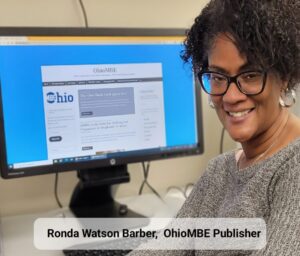By Ronda Watson Barber
OhioMBE Publisher
I recently attended a supplier diversity summit co-sponsored by the state’s largest public school system, Columbus City Schools (CCS). The CCS team representing the district at this event showed a clear lack of commitment to supplier diversity. The Equity Director seemed more focused on her presentations, delivering closing remarks to a nearly empty room. Notably, she failed to inform LEDE (Local Economically Disadvantaged Enterprise) vendors about the event and the opportunity to gain procurement information from the City of Columbus, Franklin County, Columbus Libraries, and the State of Ohio. It appeared her professional development and career ambitions took precedence over alerting LEDE vendors to this economic opportunity.
Another troubling moment came from the Director of Capital Improvements, Alex Trevino, who unabashedly referred to Columbus as a “City of Poverty.” He voiced this insensitive sentiment before a room predominantly filled with Black taxpayers residing in the district. His insistence that the program is race-neutral is problematic, as it seems to reinforce the notion that white vendors are the primary beneficiaries of a disadvantaged business program in a majority Black school district. Last school term, white vendors received fifty percent more contracts than Black vendors. It’s worth noting that most of these white vendors likely do not reside in the district and are unaffected by the significant tax increase imposed by the district.
Trevino proudly proclaimed that all the children in the district get free breakfast and lunch. His statements about a “City of Poverty” and the children getting free meals reflect how many feel about the constituents of the district. These are just poor Black kids—they don’t need clean schools. These are just Black children—they don’t need to get to school on time. In the eyes of many, poor Black children are not deserving. Because of those poor Black children, Trevino and his all white professional staff live good lifestyles. mainly in the suburbs.
The Building and Grounds staff is comprised primarily of rural white men. These MAGA men could care less about diversity and inclusion, and their work product is reflected in the shoddy, unsafe, and unhealthy buildings they are charged with maintaining. Everyone is benefiting from the efforts of Black people, except Black people. Sadly, the Black people in charge don’t appear to care.
CCS receives more tax dollars than any public school district in the state. The schools are in rotten condition by design. It is mismanagement. They propose to spend $60 million dollars a year, indefinitely, to maintain buildings and athletic facilities. Will the money contributed by Black families continue to be funneled to white businesses and the suburbs? Is it acceptable for the Black community to financially support white communities, while white employees and staff disrespect Black people who live in the City of Poverty? Too many white families are eating from the CCS trough at the expense of Black vendors and taxpayers. I don’t trust them. Actions speaks louder than words.
Columbus City Schools needs to present a comprehensive plan on how it will reinvest in the Black community as a result of the tax levy. A thorough review of the LEDE policy is imperative. Currently, any vendor in Franklin County is eligible for LEDE certification, if they meet the programs criteria. Columbus-based vendors are at a disadvantage to their suburban counterparts due to higher prices impacted by the tax levy. To truly support the local economy, LEDE vendors should be businesses that reside within the school district. Changes must be made to ensure that the benefits of these programs reach those who are most impacted by the district’s policies and tax levies.
Columbus City Schools has a moral obligation to support Black businesses in a meaningful way. The team presently assembled does not have the characteristics to do the right thing. I see career climbers, vendor registration barriers and a bunch of ‘isms contributing to the problem. If contracting with Black vendors was tied to job evaluations and pay, the white administrators and directors would overwhelmingly meet the inclusion goals and incorporate Black vendors into the district’s purchasing scheme.
just my thoughts…rwb
Discover more from OhioMBE
Subscribe to get the latest posts sent to your email.
